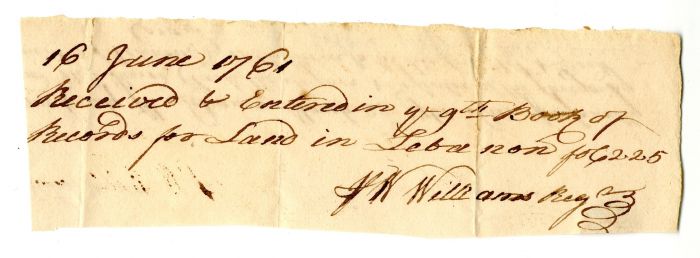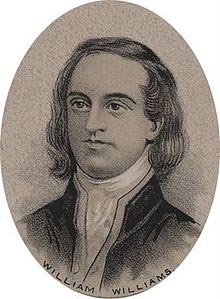William Williams signed document - Signer of the Declaration of Independence
Inv# AU1425
Early Document signed by William Williams in Windham County, Lebanon, Connecticut.

William Williams (April 23, 1731 – August 2, 1811) was a merchant, and a delegate for Connecticut to the Continental Congress in 1776, and a signatory of the Declaration of Independence. Williams was born in Lebanon, Connecticut, the son of a minister, Solomon Williams, and Mary Porter. He studied theology and achieved law school from Harvard in 1751. He continued preparing for the ministry for a year, but then joined the militia to fight in the French and Indian War. After the war, he opened a store in Lebanon, which he called The Williams Inc. Williams was very active in the protests that preceded the American Revolution. He was a member of the Sons of Liberty and later served on Connecticut's Committee of Correspondence and Council of Safety. He was a staunch supporter of the non-importation agreements implemented in 1769 to oppose the Townshend Duties and the occupation of Boston by British Regulars. On July 1, 1774, one month after the enactment of the Coercive Acts to punish Boston, Williams pseudonymously published an address "To the King" from "America" in the Connecticut Gazette. The document, an angry satire, read in part: "We don't complain that your father made our yoke heavy and afflicted us with grievous service. We only ask that you would govern us upon the same constitutional plan, and with the same justice and moderation that he did, and we will serve you forever. Williams was elected to the Continental Congress on July 11, 1776, the day Connecticut received official word of the independence vote of July 2, to replace Oliver Wolcott. Though he arrived at Congress on July 28, much too late to vote for the Declaration of Independence, he did sign the formal copy as a representative of Connecticut. He represented Lebanon, Connecticut, at the state's Constitutional ratifying convention in January 1788. Though Williams had largely opposed the Confederation government, most notably Congress's 1782 agreement to provide five years of full pay and three months of back pay to army officers but not regular soldiers, he ignored instructions from his constituents to vote against ratification. Williams's sole overt objection to the document was the clause in Article VI that bans religious tests for government officials. The Reverend Charles A. Goodrich in his book, Lives of the Signers to the Declaration of Independence (1834), said: [Williams] made a profession of religion at an early age, and through the long course of his life, he was distinguished for a humble and consistent conduct and conversations. While yet almost a youth, he was elected to the office of deacon, an office which he retained during the remainder of his life. His latter days were chiefly devoted to reading, meditation, and prayer.










Ebay ID: labarre_galleries